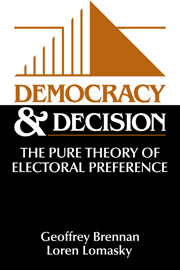Book contents
- Frontmatter
- Contents
- Preface
- 1 Ethics, politics, and public choice
- 2 The logic of electoral choice
- 3 The nature of expressive returns
- 4 The analytics of decisiveness
- 5 The theory of electoral outcomes: implications for public choice theory
- 6 From anecdote to analysis
- 7 Interpreting the numbers
- 8 Consensus, efficiency, and contractarian justification
- 9 Paternalism, self-paternalism, and the state
- 10 Toward a democratic morality
- 11 Constitutional implications
- Bibliography
- Index
8 - Consensus, efficiency, and contractarian justification
Published online by Cambridge University Press: 05 June 2012
- Frontmatter
- Contents
- Preface
- 1 Ethics, politics, and public choice
- 2 The logic of electoral choice
- 3 The nature of expressive returns
- 4 The analytics of decisiveness
- 5 The theory of electoral outcomes: implications for public choice theory
- 6 From anecdote to analysis
- 7 Interpreting the numbers
- 8 Consensus, efficiency, and contractarian justification
- 9 Paternalism, self-paternalism, and the state
- 10 Toward a democratic morality
- 11 Constitutional implications
- Bibliography
- Index
Summary
The rule of unanimity is the Wicksellian equivalent of a Pareto move, and the impossibility of securing unanimous consent for any change becomes the Wicksellian criterion for classifying an attained move as Pareto optimal.
James Buchanan, Freedom in Constitutional ContractIntroduction
The argument set out in the foregoing chapters has been developed entirely for the case of simple majority rule. Might the problems posed by the predominance of expressive elements in voters' preferences be overcome, or moderated in a significant way, if the collective decision rule were more inclusive? There is, after all, a strong tradition in public choice theory – most clearly associated with Buchanan and Tullock – that the problems associated with majority rule disappear if unanimous decisions were required. Certainly, majoritarian cycling and the resultant indeterminacy of collective decision-making processes are not present under unanimity, because the requisite redistributions from minority to majority are no longer electorally relevant.
In fact, however, the voter's dilemma problem is also present under conditions of explicit consensus. That is, the revealed preference logic fails not only in large-number majoritarian settings, but also in large-number unanimity ones: The voter's dilemma, the “veil of insignificance,” is in this sense a necessary feature of all collective decision making, not just of majority rule.
- Type
- Chapter
- Information
- Democracy and DecisionThe Pure Theory of Electoral Preference, pp. 124 - 142Publisher: Cambridge University PressPrint publication year: 1993



